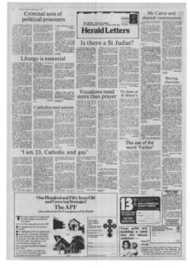Page 3, 2nd June 1978
Page 3

Report an error
Noticed an error on this page?If you've noticed an error in this article please click here to report it.
Tags
Share
Related articles
Catholicism Has A New Face In Africa, Genevieve Fox Explains
Bridges Bring Light To Darkest Africa
Pope Reaches Out On African Pilgrimage
Conflict Between Church In Zaire And 'messiah'
Newman House Closes
Scramble for Africa at root of Zaire conflict
By a Special Correspondent THE roots of the conflict in the Shaba province of Zaire lie in 19th century colonialism but t he American insistence that the Congo, as it was known until a few years ago, should be given independence earlier than planned must also take some of the blame.
The tribal problem of the area goes back to the 19th century when Britain and Belgium divided up that part of the world on a purely geographical basis. The Lunda tribe was split in three countries; Zaire, Rhodesia and Angola. That is why they now get help from their brothers just over the border where some of their loyalties lie.
In 1960 when the Congo was given its independence the Katanga province, now Shaba, tried to secede but the move was suppressed in 1963 with United Nations help. It is the children of the soldiers who fought in that war who are now taking up arms.
Since 1963 they have been living in exile in great poverty, a fertile ground for Marxism and for the Cubans and Russians who want to extend their influence in that part of Africa. Other soldiers in the rebel army are young unemployed people from other parts of Zaire who have gone to Angola.
The West is quite prepared to take the copper and other minerals from this incredibly rich area and to provide hygiene and hospitals to prevent people dying, but it hasn't provided the basis for a stable economy and employment. It hasn't provided the means for life for the people who live there.
In terms of government the problem goes back to the Belgian administration which began in 1885. King Leopold It of Belgium ruled the vast province, 80 times larger than Belgiurn, through Belgian administrators. It was called an independent state until 1908 when Belgium accepted it as a colony.
In Britain few people have a good word for the Belgian administration but in fact there were 10,000 Belgian administrators there in contrast to 800 English administrators in India which is even larger than Zaire.
On top of that there were 8,000 missionaries and when independence was granted Zaire had the highest literacy rate in the whole of Africa at 50 per cent.
In 1956 Belgium had a 30 year independence plan for Zaire but the revolt in Kinshasa in 1959 resulted in Western opinion calling for immediate independence. The Americans in particular wanted the Belgians out.
Now it looks as though, as in Indonesia, Vietnam and other places, they didn't want the colonial power out for the good of the local people but simply so that they could implant their own economic power there.
General Sese 'Seko Mobutu seized power in a coup in 1965. He was an ex-sergeant. Catholic educated. At heart he believes in a free market economy and is friendly to the West which is happy to keep him in power. At the same time he courts popularity by behaving like a nationalist dictator, despising all imported culture and stressing the value of all things African.
In the late sixties he launched campaigns against all outside influences including the Church but this led the country to virtual bankruptcy so he had to invite • the Belgians and French back and end his quarrels with the Church. In particular with world copper prices plummeting in 1975 he was forced to try to gain favour in the West again.
The Church, like the West, finds itself in a particular dilemma in Zaire. It can either collaborate with Mobutu and run the risk of identification with all the petty corruption and oppression that exists at the lower levels of power. This would at least ensure it some freedom.
On the other hand if Mobutu goes there will be anarchy and with central government unable to administer some areas ef
ficiently Mobutu cannot be held responsible for all the corruption which goes on.
During the purge of outside influences Mobutu accused Cardinal Melilla of Kinshasha of treason and forced him into exile for four months. He then nationalised the Catholic schools and imposed other laws on the Church. The disagreement, which seems to have been a matter of personality clash as much as anything — Mobutu seems to be something of an Emperor sacristan — now seems to have been straightened out. Malula returned to Zaire and Mobutu has now asked the Church to take back the administration of the schools.
The position of the church is still a tricky one, but there is no persecution. Mobutu still wants a share in the power of the Church. He lost the battle over 'sending his party members to the seminaries and while the Cardinal didn't mind seminarians being members of the party he demanded control over who went to the seminary and who didn't.
Mobutu still wants his picture in the churches and is concerned to have the loyalty of the clergy. He would pay for the bishops trips on the national airline and protect the clergy but if the Church accepts these offers it ties itself to one man. Who knows how long he will last?
•
blog comments powered by Disqus











